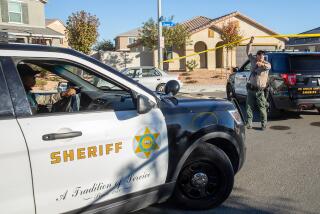The Fight Against Crime: Notes From the Front : Deputies Hope Curfews Keep Lid on Trouble
LANCASTER â For farmers far removed from the hubbub of city life, summer is the season when crops mature, but for law enforcement officials in Southern California, itâs quite the opposite.
For them, summer is the time when the crop of immature juveniles fling aside school books, yank on a pair of shorts and hop into the car in search of fun and adventure and sometimes trouble.
Los Angeles County sheriffâs deputies working in the Antelope and Santa Clarita valleys this summer are using a countywide curfew and a $50,000 grant as tools to keep city parks safe while the boys and girls of summer do their thing.
In Lancaster last week, the first curfew sweep nabbed about 60 juveniles who took advantage of the high school graduation weekend to party hearty in all six city parks, said Sheriffâs Lt. Ron Shreves, who coordinates the curfew program for the Antelope Valley sheriffâs station.
âLast week was graduation and thatâs a prime party time,â Shreves said. âThey like to hang out in parks that we donât patrol and they also like shopping centers where there are all-night restaurants.â
Lancaster city officials set aside $50,000 in special event funds in April to provide, in part, for extra police patrols to reduce curfew and park violations and the complications that come with them: fights, drunkenness and graffiti, Shreves said.
The funds will also be used to provide overtime patrols to reduce auto theft and monitor high-profile parolees and for traffic enforcement and emergency situations, said city spokeswoman Nancy Walker.
County officials passed the curfew law in 1988, crafting the ordinance so that it would escape the fate of a similar law enacted in Long Beach, which had been struck down by the state court of appeals because it made no provisions for juveniles engaged in legitimate activities.
In Santa Clarita, sheriffâs deputies enforce the cityâs curfew law with a tempered hand, and Lt. Dan Reidder says itâs important to understand teen-agersâ aims before compelling them to get off the streets.
âWe donât actively go out and enforce the curfew law, but if there is a problem, we will use it based on need,â he said.
âHot spots change on a regular basis and sometimes they (teen-agers) will go to someoneâs house to congregate and strike out from there.â
Reidder said in the three years heâs worked in Santa Clarita, authorities have never had to resort to a curfew sweep, but at the same time, he notes the differences between his city and the Antelope Valley cities of Lancaster and Palmdale.
âThere are a lot of things for a kid to do out here. In Santa Clarita, weâve got lots of theaters, the mall, activities accessible for youth to get involved in. Antelope Valley doesnât offer this much, I think.â
The curfew does not prohibit teen-agers to be out late at night if they are involved in legitimate activities such as going to see a movie, dining out, visiting a video arcade or simply browsing at the mall.
But it is designed to clamp down on the aimless kind of hanging out that teen-agers seem to especially enjoy. Most often the curfew law is summoned to stop teen-agers from overrunning local businesses or parks where drinking, fighting and sometimes drug use become a community problem, Reidder said.
In the San Fernando Valley, curfew violations take a back seat to emergency calls, and police virtually never conduct sweeps solely aimed at packing juveniles off to bed, said Capt. James McMurray, of the Los Angeles Police Departmentâs Valley Operations Division.
One of the bright spots in the battle to keep teen-agers from occasionally acting like themselves is that the law has changed and police officers can now issue citations instead of hauling kids down to the station and waiting for their parents to show up, McMurray said.
âThat is a perfect tool for this type of problem, but because of our workload, it is one of our lowest priority tickets,â he said.
More to Read
Sign up for Essential California
The most important California stories and recommendations in your inbox every morning.
You may occasionally receive promotional content from the Los Angeles Times.










